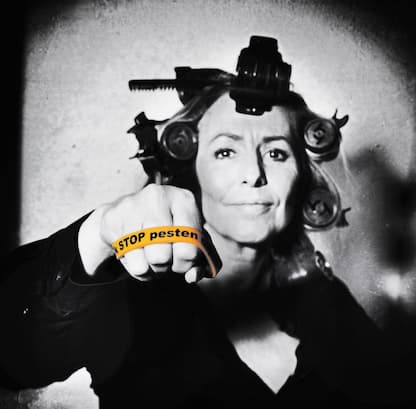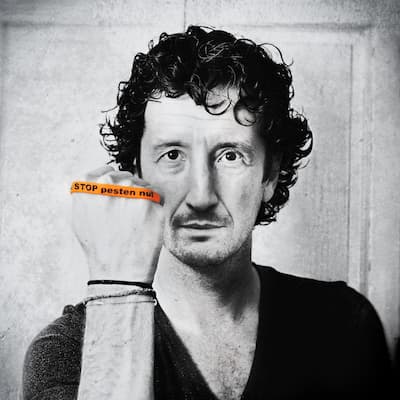"This is me pleading with you, knowing you're reading this,"
Gabbie Hanna wrote in a post urging her stalker to leave her alone. Influencers have always been subject to online harassment, but many say they've been getting more hateful, violent messages than usual over the past few months while people stay home to stop the spread of the coronavirus.
"The harassment has gotten worse, 100 percent, since lockdowns began," Erim Kaur, a lifestyle and beauty influencer, told NBC News. "People call me ugly, fat, fake. They say all sorts of horrible things about me and my family and threaten us, and you feel powerlessness against it, because they keep making new accounts."
Kaur said she and three other U.K.-based influencers created a group chat to support one another against the insults and harassment they started getting when stay-at-home orders were established. She also hired a lawyer to help her track threats last month.
Full coverage of the coronavirus outbreak
Margaret Hemenway, a YouTuber, posted a video titled "Ways to Stop Bullying/Online Harassment (My Story)" last month, saying she has "dealt with a severe case of bullying, more so this past month."
"I've been been dealing with more online harassment since the coronavirus outbreak started. However, my experience pertains to an incidence of episodic bullying that had been reoccurring for the last year and started back up again in late February/early March," Hemenway said. "The video that I published on YouTube was more focused on a single individual that would not stop harassing me, even after they had been reported and contacted by the local authorities."
Her video resonated with many who've also experienced increased levels of abuse during the stay-at-home orders.
"Many trolls are ramping up the abuse because of lockdown. They love the fact we have nowhere to go or nobody to talk to outside of social media because of the rules," a user commented. "What better ways to target somebody's mental health when they're in social isolation with their own thoughts boxed in a house using technology as our main way to communicate right now."
A series of tweets from Gabbie Hanna, an actor, musician and content creator with more than 6 million subscribers, illustrated how social media can facilitate cyberstalking and leave users fearing for their lives during the pandemic.
"The worst part of having a stalker is the paranoia," Hanna tweetedthis month. "It makes it hard to engage with fans because you never know if it's the person that hurt you behind the keyboard."
Hanna added that she had tried to no avail to block the stalker, who kept re-emerging, which is why she opted to address the stalker directly in a public plea.
"This is me pleading with you, knowing you're reading this. please, PLEASE leave me alone. leave my friends, family, and fans alone," Hanna wrote. "I don't know what you want from me, i don't know what you're looking for or waiting for. PLEASE let me live in peace."
While Hanna disclosed no additional details about the nature of the stalking, she has been vocal about dealing with stalkers and trolls in past YouTube videos. In 2015, she posted a video describing how someone she didn't know pretended to be one of her friends via text and tried to persuade her to answer invasive questions and post intimate images on Vine, the short video platform where Hanna began her career.
Neither Hanna nor YouTube responded to requests for comment. Andrew King-Ries, a law professor at the University of Montana who is chair of the American Bar Association's Commission on Domestic and Sexual Violence, said he's not "surprised that sheltering in place has exacerbated online harassment, as it has generally exacerbated the dynamics of domestic violence."
Reports of domestic violence, including stalking, have surged during lockdowns. Paladin, a U.K.-based advocacy organization that runs a stalking help line, reported an uptick in cyberstalking incidents involving social media in the first four weeks of the lockdown, and on May 6, a Georgia man was arrested on multiple counts of violating an order of protection and one count of cyberstalking, showing the continual nature of such attacks.
"My fear is that as we move more of our lives online, the devices that increase our connectivity will also create an increased opportunity for stalkers," King-Ries said. "And when a stalker or harasser can reach you online, they take away your safe space and your ability to get out, which is a horrifying aspect."
According to the Centers for Disease Control and Prevention, about 1 in 6 women and 1 in 17 men have experienced stalking, and cyberstalking, including repeatedly getting unwanted telephone calls or text messages, is the most common tactic among both female and male victims.
There have been several public cases involving YouTubers and other influencers who have been stalked in recent years, including that of Christina Grimmie, a singer who gained a following posting song covers to the platform and was killed by an obsessive fan after a performance in 2016. In 2017, a 30-year-old man was arrested and accused of harassing YouTuber James Neese, then 18 years old, by showing up at his house uninvited.
While YouTube prohibits "content that threatens individuals," the platform advises users to report threats directly to local law enforcement in its harassment and cyberbullying policy.
But King-Ries said that getting help is more difficult during the pandemic as courts' physical operations have closed and migrated online and that the coronavirus has made enforcing protective orders more challenging.
That's why influencers like Kaur are calling on platforms to enact more sophisticated ways to track and ban repeat harassers, because blocking them doesn't guarantee they won't re-emerge with new profiles.
"A person isn't allowed to go to Walmart and scream at an employee. If they did that, they would be banned from the store," Kaur said. "So when someone threatens or harasses another person on social media, they should be held to the same standards."
Source NBC news
Tip van de redactie
Heb je haast? Navigeer dan snel naar:
► Scholen & Professionals Kenniscentrum Pesten in het Onderwijs
- Of navigeer direct naar de informatie per functionaris: Schooldirectie & MT / Anti-pest coördinator / Leerkracht / Mentor / Ouderraad & MR
- Leerlingen & opvoeders: Kinderen & Jongeren (Leerlingen) / Ouders & Opvoeders
► Sportverenigingen Kenniscentrum Pesten in de Sport
- Of navigeer direct naar de informatie per functionaris: Bestuurders / Coaches, Trainers & Begeleiders / (Top)Sporters & Scheidsrechters
- Jonge leden & ouders Kinderen & Jongeren (Leerlingen) / Ouders & Opvoeders
► Werkgevers Kenniscentrum Pesten op het Werk
- Of navigeer direct naar de informatie per functionaris: Directie en bestuurders / HRM / MT en Leidinggevenden / Medewerkers / Ondernemersraden / Vertrouwenspersonen
► Ouderen Kenniscentrum Pesten in Woonzorgcentra

Breng snel een bezoekje aan ...
► Kenniscentrum (Klassiek) Pesten
► Kenniscentrum Online pesten (cyberpesten)
► Kennisbank & Downloadcentrum o.a. Beleid & Factsheets / Handleidingen / Lesmaterialen / Posters / Wetenschappelijke Onderzoeken
► Ik word gepest, wat kan ik doen
Stichting Stop Pesten Nu is het enige Erkende Goede Doel tegen Pesten in Nederland!







